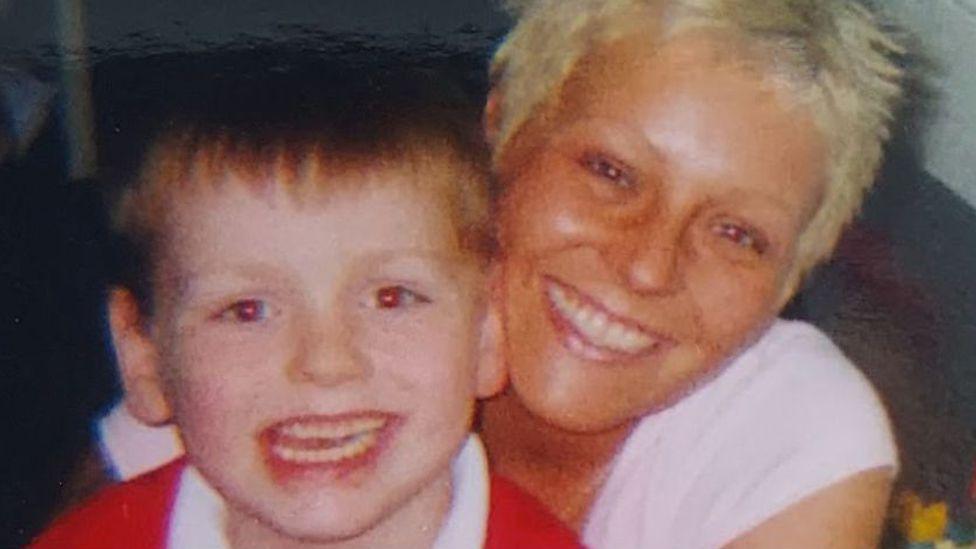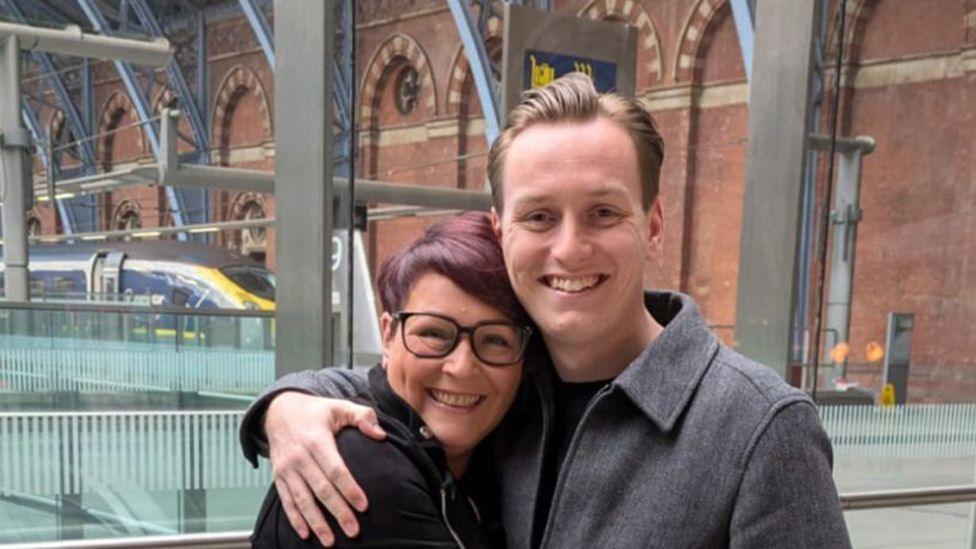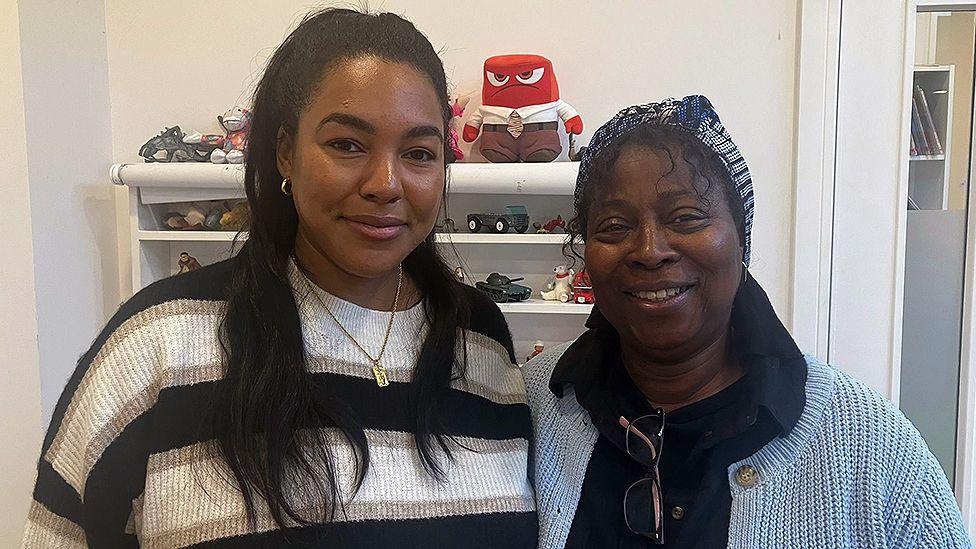Adopted children to have closer contact with birth families

Angela lost contact with her two sons after they were removed from her in 2004 and adopted by another family
- Published
Adopted children are likely to be allowed much closer contact with their birth families in the future as part of “seismic” changes recommended in a report published today. Some families say the changes are long overdue - but others worry they may deter people from adopting.
Angela Frazer-Wicks’ two sons were removed from her care and adopted in 2004, when they were aged five and one. She was in an abusive relationship and had problems with addiction and her mental health.
By 2011 Angela had recovered, she was in a new relationship, and had a baby daughter. The local authority was not involved in her daughter’s care.
Angela’s sons and their adoptive parents had stayed in touch with her - writing letters and sending photos once or twice a year. But when the older of the two boys became a teenager, he told his adoptive mother he no longer wanted to write to his birth mother. Angela carried on sending cards, but heard nothing back for years.
Then out of the blue, in 2020, Angela received an email from her eldest son. It turned out he had been trying to contact her, but the local authority had told him that wasn’t possible.
Last month, Angela met her eldest son in person - it was the first time she had seen him for 20 years.
“It was amazing for me," Angela says, "even more so for my daughter - she’s waited her entire life to meet her brother.”

Angela and her eldest son were recently reunited, 20 years after he was removed from her care
Adoption is the state’s most powerful intervention in family life. It is a permanent break between a child and their birth family, and alters the child's identity forever. In law they are no longer the child of their birth parents, and most adopted children grow up without seeing or knowing any of their birth family.
Around 3,000 children are adopted in England each year. It’s a process that must be authorised by judges in family courts, who set out the level of contact the child will have with their birth parents - usually just letters, sent twice a year, via an intermediary.
While adoption law has evolved over the years - allowing children to know more about their history than they once did, in some ways, families say, adoption is still very much stuck in the past.
Now a new report from a group set up by the most senior judge in the family court, external says wholesale reform of the system is needed.
“Letterbox” contact between adopted children and birth families is outdated, the report says, instead recommending face-to-face contact where that is safe.
The extremely detailed report is strongly supported by Sir Andrew McFarlane who says there is no need to change the law for this to happen.
The report is likely to influence family court adoption hearings throughout England and Wales.
Angela Frazer-Wicks describes her experience of adoption as a "life sentence… without any right to appeal". As chair of trustees of the charity Family Rights Group, she is pleased mothers like her will have more chance to continue seeing their children after they have been adopted.
“It’s a seismic shift,” Angela says. “It’s been such a long time coming. My hope is that we start to see just a bit more compassion towards birth families - they are so often seen as the problem.”

Cassie (left) was adopted by Dee (right) at the age of three. Cassie found meetings with her birth mother traumatic
While meeting birth family can be very positive for some adopted children, face-to-face meetings aren’t good for all children in this position.
When Cassie was adopted aged three, she constantly worried about the mother she’d been take away from.
Out shopping with her adoptive parents Dee and John, Cassie would even ask if she could buy groceries for her birth mum.
Dee was advised it would be reassuring for Cassie to meet her birth mother face-to-face.
Their reunion, in a noisy contact centre, went well – but the following day Cassie was very tired, pale and limp. Dee decided to take Cassie to the doctor, and by the time they arrived at the surgery Cassie was trembling and vomiting uncontrollably.
But there was nothing physically wrong the doctor said - Cassie was in shock.
For nearly two years Cassie and Dee went to specialist therapy. Cassie still seemed to worry about her birth mother, and would try to call her on a toy telephone.
Another meeting was arranged, in a quieter environment, with support. After that, Cassie, who is now aged 30, says she didn’t want to see her birth mother again.
“I never felt a strong urge,” she says. “I had all the information about her.”
More reporting from family courts
'I had to protect my child from her paedophile dad'
- Published20 November 2023
Why I'm seizing the chance to scrutinise the family courts
- Published30 January 2023
A mum's 'remarkable turnaround' to win her baby back
- Published8 March 2023
With more recent adoptions, there is a new kind of risk. Children can trace their birth family online - and some will go and meet them. That can lead to conflict with adoptive parents, even adoption breakdown.
“The children become very emotionally mixed up,” says Sir Andrew McFarlane, the head of the Family Court in England and Wales.
“If you’re trying to work out who you are you in the world, and you have some memory of the family you lived with until you were four or five… it’s almost natural to try and trace them and be in touch with them.”
Without expert help, this can have disastrous consequences.
In 2021 one couple told the BBC it was “devastating” to see their two adopted sons turn against them and get drawn into crime, after they had been reunited with their birth family.
There is no accurate data on how many adoptions break down. The charity Adoption UK has said it varies between 3% and 9%.
Woman wins six-figure payout after adoption broke down
- Published9 September 2024
Following a four-year review and consultation, the 170-page report published today says greater consideration should be given to whether adopted children “should have face-to-face contact with those who were significant to them before they were adopted”.
The report is intended as a review of the adoption process and a "catalyst for positive changes".
Among the dozens of other recommendations are reforming the law on international adoption, and setting up a national register for court adoption records to make it easier for people to find their own files. The report also recommends dropping the term “celebration” for parents’ last visit to court with the child they are adopting.
Many adoptive parents agree the current "letterbox" system of contact is not effective.
In a 2022 survey, Adoption UK found that most prospective adopters believed that standardising direct contact would deter people from adopting, at a time when the number of people coming forward to adopt is in decline.
But at the same time, it found that 70% of those looking to adopt believed that direct contact should be standard practice, if considered safe.
Others think it could create further problems.
Nigel Priestley is a specialist adoption solicitor and an adopter himself. He has seen the issues this contact can cause.
“I think it’s enormously risky,” he says. “In my view there is a grave danger that if you once open Pandora’s Box shutting it will be impossible.”
A Department for Education spokesperson said the value of children growing up in a loving family "cannot be underestimated". And for many children in care, "adoption makes this happen".
“We know that adoption has a profound impact on everyone involved, and it’s vital that the child’s best interests are protected and remain at the heart of the process."
Clarification 8 November 2024: This story has been amended following updated information supplied by Adoption UK
Get in touch
Are you affected by the issues raised in this story?